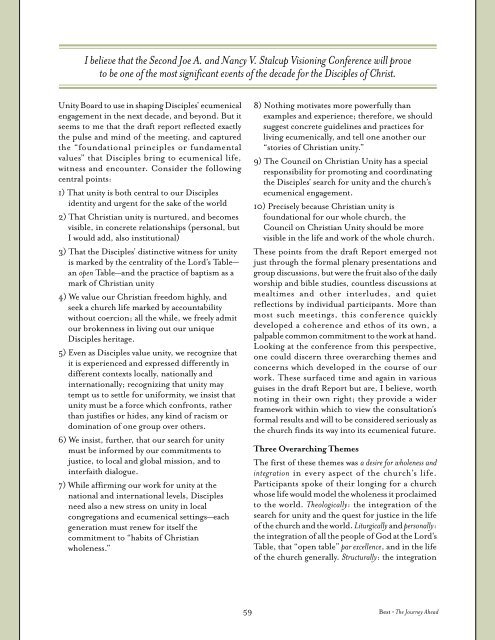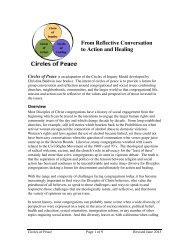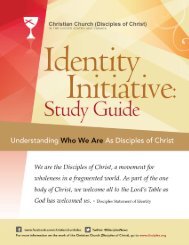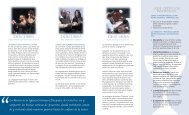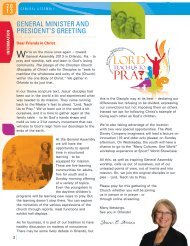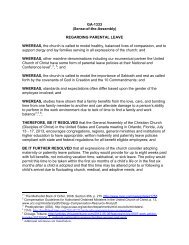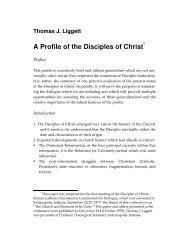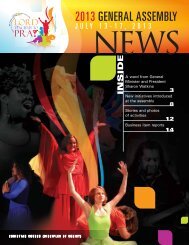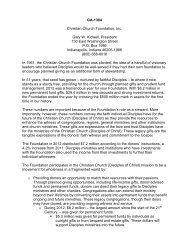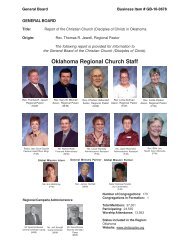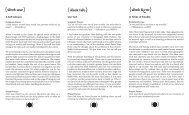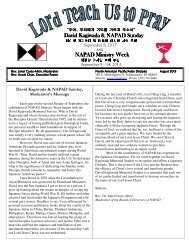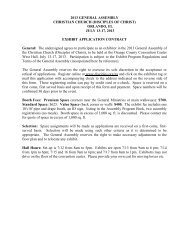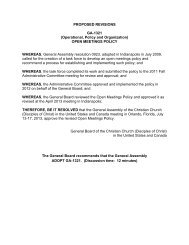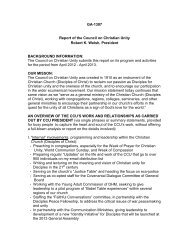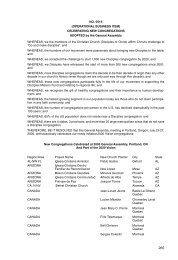RESOURCING THE CHURCH FOR ECUMENICAL MINISTRy A ...
RESOURCING THE CHURCH FOR ECUMENICAL MINISTRy A ...
RESOURCING THE CHURCH FOR ECUMENICAL MINISTRy A ...
You also want an ePaper? Increase the reach of your titles
YUMPU automatically turns print PDFs into web optimized ePapers that Google loves.
I believe that the Second Joe A. and Nancy V. Stalcup Visioning Conference will prove<br />
to be one of the most significant events of the decade for the Disciples of Christ.<br />
Unity Board to use in shaping Disciples’ ecumenical<br />
engagement in the next decade, and beyond. But it<br />
seems to me that the draft report reflected exactly<br />
the pulse and mind of the meeting, and captured<br />
the “foundational principles or fundamental<br />
values” that Disciples bring to ecumenical life,<br />
witness and encounter. Consider the following<br />
central points:<br />
1) That unity is both central to our Disciples<br />
identity and urgent for the sake of the world<br />
2) That Christian unity is nurtured, and becomes<br />
visible, in concrete relationships (personal, but<br />
I would add, also institutional)<br />
3) That the Disciples’ distinctive witness for unity<br />
is marked by the centrality of the Lord’s Table—<br />
an open Table—and the practice of baptism as a<br />
mark of Christian unity<br />
4) We value our Christian freedom highly, and<br />
seek a church life marked by accountability<br />
without coercion; all the while, we freely admit<br />
our brokenness in living out our unique<br />
Disciples heritage.<br />
5) Even as Disciples value unity, we recognize that<br />
it is experienced and expressed differently in<br />
different contexts locally, nationally and<br />
internationally; recognizing that unity may<br />
tempt us to settle for uniformity, we insist that<br />
unity must be a force which confronts, rather<br />
than justifies or hides, any kind of racism or<br />
domination of one group over others.<br />
6) We insist, further, that our search for unity<br />
must be informed by our commitments to<br />
justice, to local and global mission, and to<br />
interfaith dialogue.<br />
7) While affirming our work for unity at the<br />
national and international levels, Disciples<br />
need also a new stress on unity in local<br />
congregations and ecumenical settings—each<br />
generation must renew for itself the<br />
commitment to “habits of Christian<br />
wholeness.”<br />
59<br />
8) Nothing motivates more powerfully than<br />
examples and experience; therefore, we should<br />
suggest concrete guidelines and practices for<br />
living ecumenically, and tell one another our<br />
“stories of Christian unity.”<br />
9) The Council on Christian Unity has a special<br />
responsibility for promoting and coordinating<br />
the Disciples’ search for unity and the church’s<br />
ecumenical engagement.<br />
10) Precisely because Christian unity is<br />
foundational for our whole church, the<br />
Council on Christian Unity should be more<br />
visible in the life and work of the whole church.<br />
These points from the draft Report emerged not<br />
just through the formal plenary presentations and<br />
group discussions, but were the fruit also of the daily<br />
worship and bible studies, countless discussions at<br />
mealtimes and other interludes, and quiet<br />
reflections by individual participants. More than<br />
most such meetings, this conference quickly<br />
developed a coherence and ethos of its own, a<br />
palpable common commitment to the work at hand.<br />
Looking at the conference from this perspective,<br />
one could discern three overarching themes and<br />
concerns which developed in the course of our<br />
work. These surfaced time and again in various<br />
guises in the draft Report but are, I believe, worth<br />
noting in their own right; they provide a wider<br />
framework within which to view the consultation’s<br />
formal results and will to be considered seriously as<br />
the church finds its way into its ecumenical future.<br />
Three Overarching Themes<br />
The first of these themes was a desire for wholeness and<br />
integration in every aspect of the church’s life.<br />
Participants spoke of their longing for a church<br />
whose life would model the wholeness it proclaimed<br />
to the world. Theologically: the integration of the<br />
search for unity and the quest for justice in the life<br />
of the church and the world. Liturgically and personally:<br />
the integration of all the people of God at the Lord’s<br />
Table, that “open table” par excellence, and in the life<br />
of the church generally. Structurally: the integration<br />
Best • The Journey Ahead


